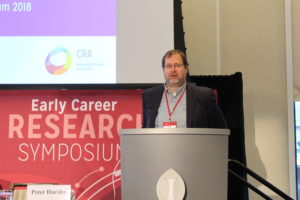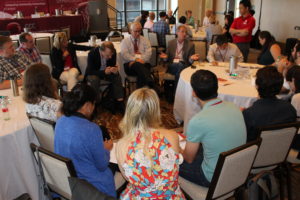 Last week we blogged about the Visioning Sessions at the Computing Community Consortium (CCC) Early Career Researcher Symposium (ECR) but this week we will talk about our government sessions and subsequent discussions on day two. The ECR brought together 73 early career researchers and gave them the unique opportunity to meet agency representatives, hear presentations about the current science policy situation, and learn how they can reach out and get involved with the science policy community outside their institutions.
Last week we blogged about the Visioning Sessions at the Computing Community Consortium (CCC) Early Career Researcher Symposium (ECR) but this week we will talk about our government sessions and subsequent discussions on day two. The ECR brought together 73 early career researchers and gave them the unique opportunity to meet agency representatives, hear presentations about the current science policy situation, and learn how they can reach out and get involved with the science policy community outside their institutions.
Computing Research Association (CRA)’s Director of Government Affairs, Peter Harsha, gave an opening plenary on “Understanding Science Policy,” in which he stressed that even though we are in an administration that is not necessarily focused on science, science policy does still matter. While the advances in IT are transforming all aspects of our lives and driving our economy, the “IT research and development ecosystem is crucial to the innovation in IT, and federal support is at the heart of that ecosystem.” Peter also commented that getting involved and talking with members of congress is an important way to advocate for computer science research even if the administration is not focused on it. See more about CRA’s work in government affairs here.
In the subsequent “Opportunities to Serve and Have Impact” panel, Greg Hager from Johns Hopkins, Henning Schulzrinne from Columbia University, and Andres Bascumbe from TechCongress talked about how early career researchers could get involved in government activities. They emphasized reaching out to organizations that you are interested in and volunteering for events. If “you volunteer for something in an organization then by becoming a part of an organization you become a part of the conversation and then you can begin to steer yourself into a field that you are particularly interested in,” said Hager. Bascumbe also highlighted the fellowship opportunities in Congress for researchers available annually through his organization.
 The day ended with round table discussions with program leads from National Institute of Health (NIH), Defense Advanced Research Projects Agency (DARPA), Intelligence Advanced Research Projects Activity (IARPA), and National Science Foundation (NSF). These conversations were scheduled to stop for lunch, but many conversations continued through lunch and into the early afternoon. Participants asked about different funding opportunities, upcoming deadlines, and navigating the review process.
The day ended with round table discussions with program leads from National Institute of Health (NIH), Defense Advanced Research Projects Agency (DARPA), Intelligence Advanced Research Projects Activity (IARPA), and National Science Foundation (NSF). These conversations were scheduled to stop for lunch, but many conversations continued through lunch and into the early afternoon. Participants asked about different funding opportunities, upcoming deadlines, and navigating the review process.
Here is a comment from one participant, Cindy L. Bethel an Associate Professor in the Department of Computer Science and Engineering at Mississippi State.
The Early Career Workshop provided a wonderful opportunity to connect with others including faculty who are early in their careers. As a more senior faculty who was a Computing Innovation Fellow it was re-energizing to me to me to interact in this type of workshop. It was also a wonderful opportunity to meet with Program Directors and Officials from different funding agencies to get feedback and learn more about the processes of the different agencies. Learning from those with my more experience and also from those with less experience enriches the overall interactions at the workshop. This was one of the best workshops that I have attended and what was interesting was I went in thinking I am not sure what I will learn from this experience and it was beyond expectation.
In a time where it might not seem like there are many opportunities for young researchers to get involved in government, these sessions during the ECR showed participants how to reach out and advocate for their own research. Times will change and IT R&D will only continue to grow and develop with endless possibilities. So don’t be shy and get involved now! See all the talks from these sessions here and the ECR website here.









